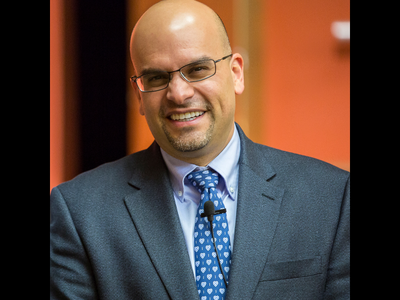Rubén Parra-Cardona is about to fly to Chile. He’s headed down as one of the rotating faculty that SHSSW sends to Pontificia Universidad Catolica de Chile to help teach their social work certificate program. By Rubén’s efforts and the efforts of faculty affiliated with the SHSSW, our school is leading a critical program of collaboration in South America that is already becoming a model program for the Latin American continent.
In addition to being an Associate Professor at SHSSW, Rubén is also the Coordinator for Initiatives in Latin America and the Area Director for Research at the Latino Research Institute. He’s been doing this work for 15 years, funded by the National Institute of Health for 13 consecutive years, researching how to produce evidence-based parenting programs and prevention parenting programs for underserved Latinx populations.
These programs focus on immigrant populations because they have a tendency to be uninsured. As Rubén explains, “They don’t have access to services like many of us do; however, they are the backbone of this economy in so many ways. For the amount of work and contribution that they offer, the benefits they get are very minimal. The concern is elevated rates of child maltreatment because they don’t have access to an evidence-based parenting program.”
Rubén works with a team of Mexican scholars and scientists specializing in parenting. They started first with families in Austin, working with churches because of their accessibility and sense of safety. COVID-19 caused things to change very rapidly, but the program pivoted to an internet-based model that is thriving. Currently, the team needs to show the feasibility of planting these programs in a community. Rubén says that he is hoping to take this program northeast to Massachusetts, working with Latinx families there. “You start presenting your work, and it’s just a trickle-down effect,” he explains. This program will be a collaboration between SHSSW and Harvard Psychiatry.
Outside of the US, Rubén and his team’s work has already been going on for over a decade. The work in Mexico, 16 years strong, varies determined by the political climate and changing administrations at the state and federal levels. Each region has its own difficulties to overcome. For example, Chihuahua, the state that Rubén himself is from, struggles with insecurity that has made it difficult to have continuity with projects. The team is moving towards actively training mental health professionals instead of conducting studies. In contrast, Chile is already scaling up the adapted parenting program that Ruben has implemented in the US for the past 13 years with Latino immigrant populations.
The social workers in Chile, in Rubén’s words, are “running the show in their own country.” SHSSW has been assisting with publications and collaborations for the past 4 years. Rubén and his team are collaborating with the San Carlos de Maipo Foundation alongside the Pontificia Universidad Catolica de Chile. With the funding support and leadership commitment of then-dean Luis Zayas, the SHSSW team initiated a certificate program through a very well-established social work program at PUCC—the first clinical MSSW program in the country. Through this arrangement, 5 faculty from SHSSW teach at PUCC, rotating out yearly. Two of the faculty are from medical social work while 3 are from specifically social work. Rubén is one of these faculty members. Dean Cole has already expressed to Pontificia University the resolved commitment to support and expand this initiative to include academic exchanges of faculty and students, particularly because this work constitutes a strategic international initiative for the SHSSW.
The future of these international collaborations is bright and promising, despite challenges that the team has faced. “Currently we’re working towards expanding our academic exchange efforts to involve faculty and students in the future,” says Rubén. “We want to provide these interventions to every family that wants them.”


